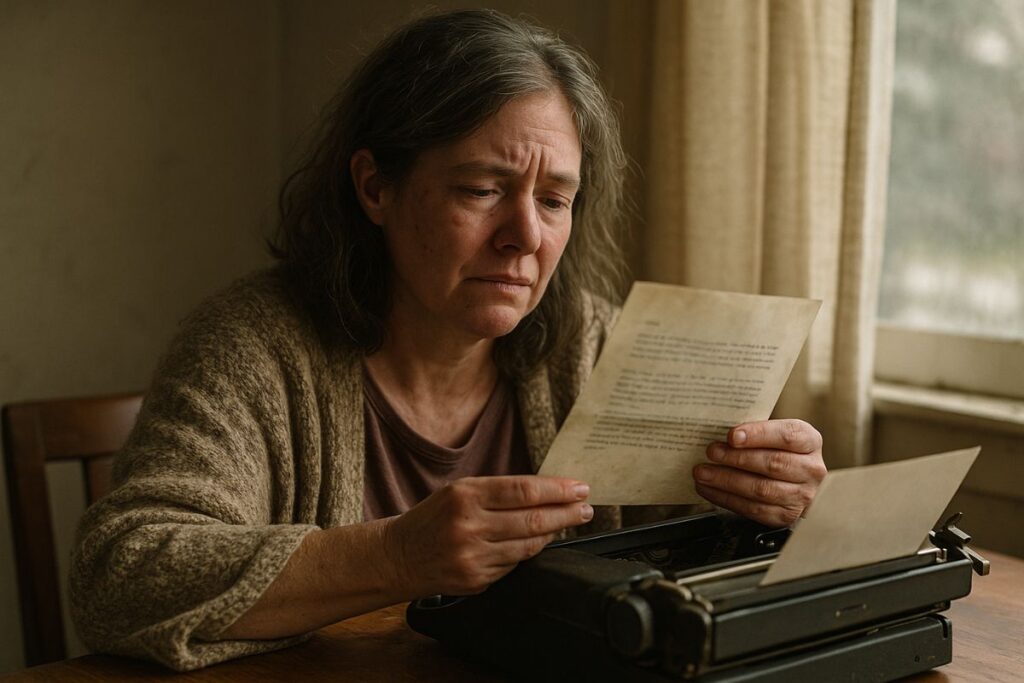🟫 Part 8 – The Apology I Never Gave
The envelope was pale blue, barely holding its shape.
Taped shut, not sealed.
As if he had planned to open it again someday, or maybe… just couldn’t bring himself to finish what he started.
Across the front, the title was typed in lowercase:
“the apology i never gave”
No date.
No location.
Just a page that had waited longer than it should have.
Elena sat at the kitchen table again, the quilt draped over her lap like second skin.
The radiator hissed softly in the corner.
She turned on the small lamp near the fridge.
The same one her father always used during his early morning routines—tea, toast, silence.
She opened the envelope and unfolded the single page inside.
“It was raining that day.
You were eight.I came home from work late, soaked and tired and carrying a weight I didn’t know how to share.
You had left your bike in the driveway. Again.I stepped out of the truck, slipped on the wet concrete, and dropped the groceries.
I yelled. Loud.You ran out in your socks, stood in the doorway, and just stared.
I think I said something like,
‘Do you ever think about anyone but yourself?’”
Elena felt a jolt of memory—faint, like a photograph left too long in the sun.
She remembered his boots by the door.
The broken eggs on the step.
And the shame, wide and sudden, that had risen in her chest before she turned and ran to her room.
“You didn’t cry.
Not where I could see.
You just disappeared.And for weeks after that, you cleaned up everything before I came home.
Even things you didn’t mess up.I thought it was helpful.
I told myself you were growing up.But now I see it wasn’t helpful.
It was fear.You were afraid of making me tired.
Afraid of becoming one more thing I couldn’t carry.”
Elena let the page slip to the table.
Her chest tightened—not with grief this time, but recognition.
She hadn’t remembered the details.
But she remembered the feeling.
The way she had learned to tiptoe around his moods.
The way she had learned to fix things before they broke, just in case.
She walked slowly to the sink, filled a glass of water, and drank it halfway.
Outside, the trees swayed gently in the wind.
A dog barked in the distance.
Life, undisturbed by the storm of memory inside her.
She returned to the table and finished the letter.
“I never said I was sorry.
I think I tried, once—bought you a new book from the school fair.
Left it on your bed with a note that said, ‘Love you always.’But I never said the words that would’ve mattered.
So I’m saying them here:
I was wrong.
I was tired, but that wasn’t your fault.
You were a child. And I was your father.
And I should’ve never made you feel like one more weight I couldn’t hold.”
Elena closed her eyes, let the warmth from the old lamp soften the ache rising in her chest.
She hadn’t needed him to be perfect.
She just needed to know he saw it.
That he knew.
And now she did.
Back in the attic, she returned to the typewriter.
The ribbon ink was fading, but the keys still struck true.
She pressed gently, deliberately.
“Dear Dad,
I remember the eggs.
I remember running to my room and writing in my journal that I didn’t want to be ‘a bother’ anymore.I didn’t know you noticed.
I didn’t know you carried that moment all these years.Thank you for remembering.
And thank you for saying it.Because even after all this time,
I think that’s all I ever needed.”
She let the page roll forward, then added:
“I’m not afraid of your memory, Dad.
Not anymore.And I think—
maybe you weren’t afraid of mine, either.”
She looked around the attic, her eyes landing on small details she hadn’t noticed before.
A paper snowflake taped to a wooden beam.
A rusted thermos with her initials scratched into the lid.
A calendar from 1993, still hanging, still open to April.
This space had held more than storage.
It had held love in its quietest form.
She went back down the ladder.
Paused at the base, her hand resting on the rail.
The hallway light flickered once—just a bulb tired of waiting.
She smiled.
In the living room, she lit the small candle again.
Pulled out her own journal—the one she hadn’t touched in years.
She wrote:
“He didn’t always say the right thing.
But he said the honest thing.
And sometimes,
honesty is just love with its coat off.”
Outside, the first snowflakes of the season began to fall.
Small, drifting, quiet.
Inside, Elena folded the letter, placed it in her own envelope this time, and labeled it:
“For the child I used to be.”
She tucked it into the cedar chest beside the quilt.
Closed the lid.
And finally, turned out the light.
Continue Reading 🟫 Part 9 – Your Voice at the End


